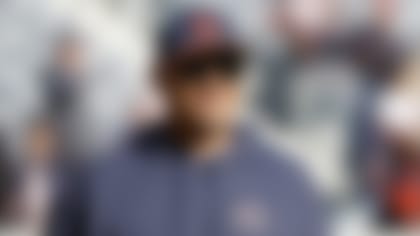For all the rookie-camp trend spotting, the Miami Dolphins won't know if the experiment in information and health retention with their newest players was a success until the rookies start filtering in with the veterans a week from now.
That is when the Dolphins, like many other NFL teams, hold their first OTA workouts. For the Dolphins, it will offer the first tangible evidence of whether an initial foray into classrooms and meeting rooms is a better preparation for the rigors of pro life than three days of often-ragged practices.
Coach Adam Gase credits Los Angeles Rams coach Jeff Fisher -- who has, for several years, had his rookies practice in super-slow motion -- with changing the idea of what a rookie minicamp could be. But Gase said he first noticed something might need tweaking in 2007, when Gase was the quarterbacks coach for the Detroit Lions and their first-round draft pick that year -- a receiver by the name of Calvin Johnson -- was not getting any repetitions during practice, because there was simply too much for a rookie to absorb. So when Gase got the chance to shape his own rookie minicamp, he consulted with Fisher and then eliminated practices entirely, focusing on mental reps to tell players what will happen on and off the field.
Gase has to hope it works out as well for his first-round draft pick this year as it ultimately did for Johnson. It was difficult not to be struck by the fortuitous timing of the Dolphins' approach. Among the sessions in the rookie camp, the Dolphins brought in former players -- deeply respected former Dolphins linebacker Zach Thomas among them -- to school the rookies on what it takes to be a pro, how to handle the media and how to care for their bodies. Sitting in the audience was offensive lineman Laremy Tunsil, who someday will have quite a lesson to deliver after his own draft-night crash course in the pitfalls of youthful indiscretion, betrayed trust and social media.
By the time rookie camp was over, Tunsil seemed to have recovered from his public embarrassment -- and the loss of millions of dollars because of his mini-slide down the board. He emerged with his playfulness and sense of humor intact, engaging with reporters in an upbeat press conference and noting he would like to be asked to play tight end.
"He was like that when we interviewed him; that's how he was," Gase said after the rookie camp ended. "I try to think how I would have reacted if that had been me. It had to be crushing. You're sitting there. You're not getting picked. He did a great job of putting on a smile. The only thing I can say to him is, it's unfair it happened, but it's the best thing that it happened, because you're here. There are a lot of good coaches on the staff, a lot of good people on this team. He's surrounded by a good bunch of people. He couldn't have ended up in a better spot."
If that is the end of it -- Tunsil is believed to have never failed a drug test -- then the Dolphins probably got one of the steals of the draft at a position where help was desperately needed. The Dolphins have allowed 186 sacks over the last four seasons, more than every team but the Jaguars (222), undoubtedly coloring the development and assessment of four-year veteran Ryan Tannehill at quarterback (it was no surprise that Tannehill was one of the first people to text Tunsil after he was drafted).
Last season underscored the dearth of offensive line quality in the league -- think of how many teams, including the champion Denver Broncos, struggled there -- and for months, Tunsil was the presumptive first overall pick, until the Titanstraded the top spot to the quarterback-needy Rams. Once OTAs begin, the Dolphins will get their first chance to evaluate Tunsil, and to give serious consideration as to where he might play. With veteran Branden Albert, a Pro Bowl alternate last season, expected to remain at left tackle, Tunsil could move to right tackle or inside to guard for the time being. The left tackle of the future would, for now, serve as the versatile lineman that every team craves.
Tunsil's move would be part of Gase's overall plan to create depth on the line. He said he has "zero concern" about Tunsil's ability to play guard.
"I just want to see him getting better as a player," Gase said. "I'm excited to see him at OTAs, learning the offense. We're just going to try to figure out who the best five are. It's going to be a long process. We're going to be moving all the guys around. We already started that in veteran minicamp. I don't think we started a period with the same lineup as any other. We're trying to cross-train guys. In my experience, you want to cross-train as many as possible. You have seven guys up on game day. You don't want, 'So and so can't do this.' You want, 'You're a backup, but he can snap and play both guards and might be able to play right tackle.' There's a lot of pressure if there's an injury. I'm not going to be saying, 'we can't throw the ball.' "
How well Tunsil adapts will be one of the indicators about the effectiveness of the no-practice camp. With no pressure to practice, players were free to ask more questions in a classroom setting. The premise, Gase said, was that if the Dolphins hope to get help from eight to 10 rookies this season, it was better to get them ready for the responsibilities ahead than to spend three days trying to find one undrafted free agent among tryout players.
The team also got an opportunity to evaluate how and to what extent the newest players retain information.
"It's just no different to me than anybody starting a brand new job," said assistant head coach and special teams coordinator Darren Rizzi. "You start a new job with Apple, what do they do? They send you for a two-week orientation. You start a new job with Google, they put you in an orientation program. They're not going to just throw you out into the field."
And when the Dolphins did take the field at the end of rookie camp -- for just 30 minutes of stretching in cleats and shorts and a very brief look with position coaches at what drills they would be doing in the future -- the lack of activity had an unintended benefit. Gase glanced over to his wideouts, whose coach, Shawn Jefferson, had already ratcheted up the intensity.
"I'm thinking, 'What part of not getting hurt do you not get?' " Gase said. "Once you get on the field, the energy level goes up. Our guys are dying to get on the field, even just to stretch."
Follow Judy Battista on Twitter @judybattista.













